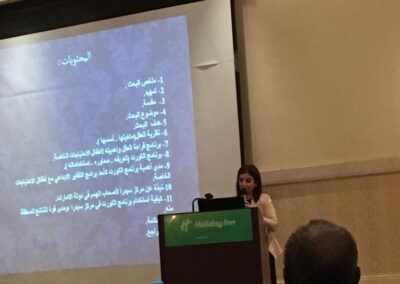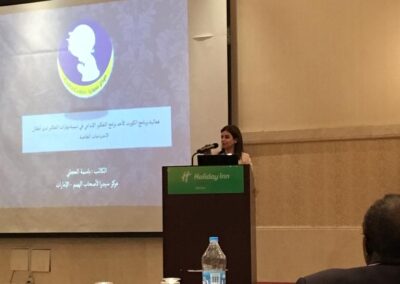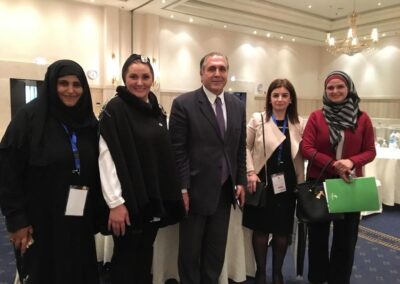The 3rd Arab Conference on Thinking, Creativity, and Innovation – March 22, 2019, in Jordan
Effectiveness of the CoRT Program as One of the Creative Thinking Programs in Developing Thinking Skills in Children with Special Needs
Cedra Center’s Participation in the 3rd Arab Conference on Thinking, Creativity, and Innovation
March 22, 2019 – Jordan
Presented by: Ms. Basma Alhajali, Director of Cedra Center
Keywords: Theory of Mind, CoRT Program, Mind Reading Program, Cedra Center for People of Determination, Creative Thinking
Contents:
-
Research Summary
-
Introduction
-
Preface
-
Research Topic
-
Research Objective
-
Theory of Mind (Definition – Principles)
-
The Mind Reading Program and its Importance for Children with Special Needs
-
The CoRT Program (Definition – Modules – Applications)
-
Importance of the CoRT Program as a Creative Thinking Program for Children with Special Needs
-
Overview of Cedra Center for People of Determination in the UAE
-
Implementation of the CoRT Program at Cedra Center and the Strength of its Outcomes
-
Conclusion
-
References
Research Summary:
Starting with Costa (1), who defined thinking as “the mental processing of sensory input to form ideas that lead to understanding and judgment,” this concept is particularly relevant when considering the sensory processing abilities of children with special needs and their role in perception and judgment.
Barbara Pressisen defined thinking as “a complex cognitive process that operates after acquiring knowledge or as an organized process aimed at acquiring knowledge.” In this context, individuals with special needs can form knowledge after skill training.
Finally, Edward de Bono (2) described thinking as “a skill through which intelligence operates, based on experience,” emphasizing how different stages of therapy and rehabilitation for children with special needs—according to their measured intelligence—can create experiences that enable brain activity and cognitive functioning.
According to Dr. Fathi Al-Jarwan in his book “Teaching Thinking: Concepts and Applications” (3), researchers observed that the complexity of thinking tasks depends primarily on the level of difficulty and abstraction. Simple tasks like recalling one’s name require minimal cognitive effort, while more abstract questions like imagining a world without electricity demand complex mental activity (Udall & Daniels, 1991). Hence, thinking can be divided into:
-
Basic Lower-Level Thinking
-
Complex Higher-Level Thinking
Basic thinking includes essential skills such as acquiring and recalling knowledge, observation, comparison, and classification. Mastery of these is crucial before progressing to higher-order thinking. For example, someone unfamiliar with computers cannot effectively imagine a world without them.
With this foundation, Cedra Center in the UAE adopted various thinking programs (CoRT, Mind Reading, Six Thinking Hats, Brainstorming) to reshape the relationship between intellectual delays and poor thinking abilities. The results were remarkable, leading to the development of cognitive, social, and communication thinking among children with a variety of needs (below-average intelligence, borderline intellectual functioning, mild mental disorders, pragmatic communication disorders, and learning difficulties). These children learned to think creatively and solve problems, even in unfamiliar or surprising situations—skills that are typically weak points in their daily lives despite previous training.
Preface:
“I think, therefore I am.” – René Descartes
Many assume that daily activities reflect thinking, but true thinking is life itself—it is continuity. Without it, weakness, regression, and defeat prevail. Thinking enables humans to triumph, dream, act, and innovate. It is our responsibility to use this power and realize our potential. Without thinking, our existence lacks depth and direction.
Introduction:
Inspired by René Descartes (1596–1650), the French philosopher, mathematician, and physicist, who rejected traditional truths in search of genuine knowledge, we reflect on his method of beginning with doubt—even in seemingly clear facts. He challenged Aristotelian logic and called for a new path akin to mathematical reasoning: starting from the simplest concepts and progressing to complex ones.
Descartes emphasized intuition—an intellectual act through which we perceive undeniable truths. He believed it to be a natural light or instinctive intellect that enables us to form knowledge. This intuition is key when working with children with special needs, helping them grasp basic concepts and their interrelations (e.g., night follows day). Thus, using intuition as a starting point for developing thinking in these children proved highly effective.
Research Topic:
Thinking is a divine faculty that distinguishes humans. When we compare neurotypical individuals with those with atypical development, the gap lies not just in intelligence, but in how one knows how to think. For 15 years, Cedra Center has worked to bridge this gap—not through ignoring differences, but by embracing them with tools, techniques, and experiences that uncover each child’s potential.
Without sharing knowledge and fostering creativity among our children, we cannot combat mental stagnation. We must encourage out-of-the-box thinking in partnership with diverse generations and abilities. Hence, this research explores how to adapt creative thinking programs to develop thinking skills in children with special needs, aiming to bring them closer in function to their neurotypical peers.
Through years of experience, Cedra Center found that many treatment outcomes required updating and re-evaluation. Eventually, the integration of creative thinking programs across rehabilitation sessions led to clear advancements in cognitive skills at all levels.
Research Objective:
Children with IQ scores between 75 and 89—below the average range according to the Stanford-Binet Intelligence Scales, Fifth Edition—often lacked foundational thinking skills. They struggled with imagination, abstract reasoning, and problem-solving in increasingly complex life situations.
This study aimed to introduce them to structured thinking methods—like the CoRT Program—to build a thinking foundation. It focused on how to implement CoRT tools with this population, highlighting two modules as examples and analyzing the program’s broader impact on general knowledge acquisition beyond therapy settings.
Importantly, the Mind Reading Program was first used as a precursor to activate mental processes in younger children (under age 9), making the later transition to the CoRT Program more feasible and impactful.





